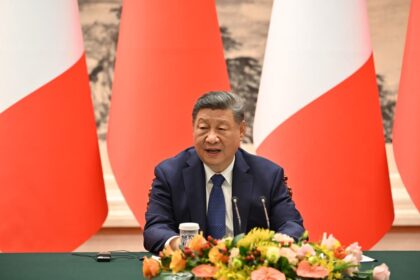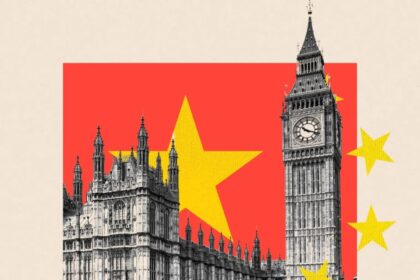Early hopes for a thaw collide with a new storm over Tempest
Disney+’s political thriller Tempest, fronted by Korean star Jun Ji Hyun, has set off a fierce backlash in China after a scripted line about China and war went viral. The series, which follows a former United Nations diplomat who enters South Korea’s presidential race while probing a deadly conspiracy, includes a scene where her character questions China’s intentions in a tense diplomatic exchange. Chinese social media users reacted with anger, accusing the show of painting China as aggressive and hostile. The uproar quickly expanded beyond the episode to focus on the show’s visual choices and symbolism, and it has revived calls inside China to keep long running restrictions on Korean entertainment firmly in place.
- Early hopes for a thaw collide with a new storm over Tempest
- What sparked the fury
- The unofficial ban and why it matters
- Brands move quickly as social media pressure grows
- How audiences in China are watching Tempest
- Creative choices and the line between fiction and offense
- What it means for Korean studios, streamers, and talent
- Could the thaw resume
- Key Points
Disney+ does not operate in mainland China, yet Korean dramas still find large audiences through unofficial viewing routes and online chatter. That parallel attention economy can move fast. Within days, Chinese users amplified criticism across platforms, urging brands to cut ties with Jun and pushing hashtags that framed Tempest as disrespectful. The pressure campaign gathered momentum as netizens collected scenes they viewed as insulting, turning one character line into a wider indictment of the show’s creative direction.
The timing is sensitive. For months, there had been guarded optimism that cultural exchanges between China and South Korea might expand after years of strain. A handful of Korean performers appeared in Chinese venues and both governments spoke about restarting people to people links. The Tempest dispute now tests whether that tentative opening can withstand a fresh surge of nationalism and whether companies and venues will choose caution over engagement.
What sparked the fury
The spark came from a single piece of dialogue. In a high stakes meeting, Jun Ji Hyun’s character confronts her counterpart about the risks of brinkmanship near the Korean peninsula. The line, widely shared in China out of context, became a rallying point for backlash and was treated as a statement about national character rather than a fictional politician’s gambit inside a thriller.
In episode four, Jun’s character poses a blunt question during a diplomatic scene. She says:
“Why does China prefer war? A nuclear bomb could fall near the border.”
Critics online framed that line as defamatory and historically illiterate, arguing that China is not predisposed to war and that the script smeared the country as reckless. The storm then widened to other elements. Scenes intended to represent the northeastern port city of Dalian appeared to have been filmed in older neighborhoods of Hong Kong. Viewers argued the visuals made Dalian look shabby, a choice they saw as intentional. A banquet setup on a red carpet with yellow stars was likened to a stylized version of the Chinese flag. Jun’s recitation of a classic Li Bai poem also prompted complaints about accent and cadence. In another scene, a villain speaks Mandarin, which some viewers read as a political statement rather than a character trait.
What began as a script issue evolved into a broader challenge to the show’s perceived attitude toward China. Nationalist voices urged a continuation of China’s limits on Korean pop culture, and public pressure targeted the actress’s brand partners.
A Weibo user with a widely shared post put it starkly:
“Keep the K drama ban to the death, thank you.”
On rating sites used by Chinese audiences, the criticism was equally sharp. A Douban reviewer summarized the complaint this way:
“The dialogue smears us as crazy for favouring war, the villains frequently speak broken Chinese, and the use of Hong Kong’s old neighbourhoods combined with a gloomy filter to portray Dalian as a slum. The targeting is self evident.”
The unofficial ban and why it matters
For nearly a decade, Korean entertainment in China has faced a complex mix of regulatory barriers and market caution. The downturn began in 2016 after South Korea agreed to host the US Terminal High Altitude Area Defense system (THAAD), a missile defense battery designed to track and intercept ballistic missiles. Beijing objected to the radar’s potential reach into Chinese territory and, without announcing a formal prohibition, Chinese platforms and organizers sharply curtailed Korean content, events, and promotions. Television dramas vanished from schedules, concerts were canceled, and brand campaigns with Korean stars quietly disappeared.
The result reshaped the regional media economy. Korean companies lost access to what had been their most lucrative overseas market, and Chinese producers accelerated investment in domestic stars and formats to keep audiences engaged. A generation of Chinese creators grew into that space. That shift is one reason the current backlash resonates: many viewers feel they do not need imported shows and can simply choose local titles or foreign content that steers clear of political landmines.
This year brought small signs of a reset. Officials discussed restoring cultural exchanges, and a few Korean acts performed in mainland venues. Several showcase events were scheduled, yet some were canceled or postponed for local reasons, reflecting an environment where approvals can change quickly. The Tempest dispute now gives skeptics fresh justification for restraint, making any broader reopening more complicated.
Brands move quickly as social media pressure grows
As criticism swelled, attention turned to Jun Ji Hyun’s endorsements. Her image has long been valuable in China, where shows like My Love from the Star made her a household name and helped sell everything from cosmetics to fashion. The backlash brought brand risk into sharp focus. Luxury and beauty labels faced calls from Chinese consumers to distance themselves from the actress or face boycotts.
In response, major brands that feature Jun in global campaigns pared back her visibility on their Chinese social accounts. La Mer, Louis Vuitton, and Piaget removed many posts and visuals featuring the actress from platforms like Weibo and Xiaohongshu, and her ambassador profile was taken down in some official channels. These steps align with how multinational brands often act in China during political flare ups: limit exposure, avoid public statements, and wait to see whether attention subsides.
Jun’s management pushed back on the idea that commercial work in China had been pulled because of the show. A spokesperson for her agency said earlier cancellations predated the controversy and were explained by local conditions rather than politics. The agency stated:
“It is baseless to claim that Jun Ji Hyun’s Chinese advertisements were canceled due to Tempest. Scheduled events and shoots had been postponed even before the series. After several delays, they were ultimately canceled for local circumstances.”
Corporate communications in such moments remain deliberately cautious. Brands try to stay on the safe side of public opinion in China while preserving global relationships with talent. That balancing act often plays out quietly on social channels and e commerce listings rather than in press releases.
How audiences in China are watching Tempest
While Disney+ is unavailable in mainland China, Korean dramas routinely spill into Chinese online discourse through clips, translation accounts, and private chat groups. Some viewers use virtual private networks to stream, while others rely on unauthorized sources. That is why a series can trend, earn thousands of short reviews, and influence consumer sentiment without any official distribution.
Tempest has drawn low marks on Douban, where the show’s page reflected a rating in the low fours, with a majority of single star scores. User comments focus on the controversial line, the portrayal of Dalian, and perceived symbolism. These discussions matter because they shape what platforms and sponsors view as acceptable risk if a title ever seeks an official route into China.
Officials have kept their language general. A Chinese foreign ministry spokesperson addressed concert postponements and cultural events in recent remarks, saying China supports exchanges without endorsing specific shows or artists. The spokesperson said:
“China does not oppose beneficial cultural exchanges.”
That stance leaves wide discretion for local authorities and market players to decide what moves forward. The space between policy signals and platform decisions remains large, and online sentiment often fills the gap.
Creative choices and the line between fiction and offense
Cross border storytelling often lands in a gray zone where artistic license collides with national pride. Tempest is a thriller about power, assassination, and diplomacy, so charged language and stylized sets are part of the genre. Chinese viewers saw specific choices differently. A Dalian backdrop that looked like an old Hong Kong block, a red star motif underfoot, a poem recited with a foreign accent, and a Mandarin speaking villain counted as more than props and performance. Each detail could be read as disrespectful or provocative when stitched together.
Supporters of the actress argue that an actor delivers words written by others and judged by directors and network executives. Detractors counter that leading stars profit from projects that take risks with a neighbor’s image, so criticism is fair. The argument reflects a broader debate about who bears responsibility when culture crosses borders and context gets lost.
Some of the online commentary went beyond the show to taste and identity. One widely shared jab targeted viewers themselves. A netizen wrote:
“It’s already 2025 and you’re still watching K dramas, how tacky!”
That kind of language underscores how cultural choices have become signals in a larger contest over image and influence between two media heavyweights in Asia.
What it means for Korean studios, streamers, and talent
For Korean producers and global streamers, China has always been both a prize and a puzzle. The market offers scale, but the rules are fluid and the red lines can shift. The Tempest controversy will influence how future projects set scenes in China, how scripts reference foreign policy, and how marketing teams prepare for backlash. Creators may consult cultural advisors more often and reconsider visual cues that can be misread. That can reduce friction in some cases, yet it also risks making thrillers tamer and less specific.
For talent and brands, the takeaway is practical. Endorsement rosters get reviewed quickly when nationalist campaigns take off. A-listers expect fluctuations across markets, but the speed of social media pressure in China creates unique exposure. Agencies and labels tend to keep options open, clearing posts without ending contracts, and waiting for attention to move on. The calculus will vary by company, yet the costs of misjudging sentiment can be steep, from canceled events to lost storefront placements.
Could the thaw resume
Signals are mixed. The two governments have discussed rebuilding cultural exchange and some live events went ahead this year. Others stalled or were canceled with little notice, showing how quickly the environment can tighten. The latest backlash strengthens voices that prefer a slow lane for Korean content. At the same time, audiences in both countries still seek entertainment across borders, and unofficial channels will continue to move clips and conversation.
In practice, entry into China for Korean shows will likely remain case by case. Projects with minimal political touchpoints stand a better chance, while titles that place China near the center of their plot will face intense scrutiny. For now, Tempest has become a cautionary tale for producers and advertisers measuring cultural ambition against reputational risk.
Key Points
- Jun Ji Hyun’s new Disney+ series Tempest sparked a backlash in China after a scripted line asked why China prefers war.
- Chinese social media users said the drama misrepresented China and criticized scenes depicting Dalian, flag like imagery, a poem recital, and a Mandarin speaking villain.
- Calls grew to maintain China’s limits on Korean entertainment, often described as an unofficial ban dating to 2016 after the THAAD deployment.
- Brands moved fast under pressure, with La Mer, Louis Vuitton, and Piaget removing Jun related posts in China facing markets.
- Jun’s agency said ad cancellations were not linked to Tempest and cited earlier scheduling and local conditions.
- Disney+ is unavailable in mainland China, yet clips and discussions spread through VPNs and unauthorized channels.
- Tempest drew low ratings on Douban, where a majority of user scores were one star and comments focused on the show’s portrayal of China.
- A Chinese foreign ministry spokesperson said China does not oppose beneficial cultural exchanges, leaving room for selective engagement.
- The dispute arrives as tentative cultural exchanges were reemerging, raising doubts about how widely K dramas and K pop will return to China.
- The episode highlights the business risks for studios, streamers, and luxury brands when fiction collides with nationalism in a key market.












